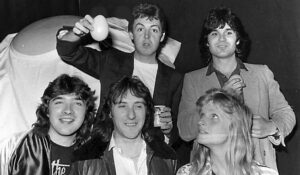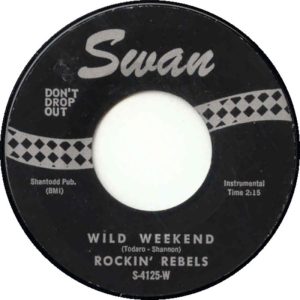AND AFTER THE BEATLES THERE WAS…WINGS

After the Beatles broke up in 1970, McCartney recorded two albums: McCartney, (1970), credited to himself, and Ram, (1971), with wife Linda. He had insisted from the beginning of their marriage that Linda should be involved in his musical projects, notwithstanding her lack of previous experience as a musician, so that they did not have to be apart when he was on tour. Ram was recorded in New York where McCartney auditioned a number of drummers and guitarists, selecting Seiwell and guitarist David Spinozza. When Spinozza became unavailable due to other session commitments, Hugh McCracken was enlisted to take his place.
After the release of Ram, McCartney decided to form a new group and asked Seiwell and McCracken to join. Seiwell accepted, but McCracken declined, so McCartney invited Denny Laine whom he had known since the early 1960s, to join. Laine, who was working on a solo album at the time, got a phone call from McCartney enquiring if he would like to work with him, as McCartney said: “I’d known him in the past and I just rang him and asked him, ‘What are you doing?’ He said, ‘Nothing’, so I said, ‘Right. Come on then!’ Laine then dropped plans for his album there and then.
In August 1971, Seiwell and Laine joined Paul and Linda McCartney to record Paul’s third post-Beatles album for Apple Records. The result was Wild Life released on December 7. It was the first project to credit Wings as the artist. The band name is said to have come to McCartney as he was praying in the hospital while Linda was giving birth to their second child together, Stella on September, 13 1971. Paul McCartney recalled in the film, Wingspan that the birth of Stella was “a bit of a drama”; there were complications at the birth and that both Linda and the baby almost died. He was praying fervently and the image of wings came to his mind. He decided to name his new band “Wings”.
The band’s first two albums, Wild Life and Red Rose Speedway (the latter featuring guitarist, Henry McCullough) were viewed as artistic disappointments beside McCartney’s work with the Beatles. In an attempt to capture the spontaneity of live performances, five of Wild Life’s eight songs were first takes by the band. The album included a cover of Mickey and Slyvia’s, Love is Strange. Like Ram, Wild Life left music critics cold, a response that typified the anti-McCartney sentiments that prevailed among the music press following the Beatles’ break-up. Wings struggled to gain artistic credibility, particularly during the early 1970s, with critics, fans and McCartney’s musical peers alike ridiculing the inclusion of Linda as a keyboard player and backing vocalist.
After the release of title track of the James Bond movie Live and Let Die McCullough and Seiwell resigned from the band. The McCartneys and Laine then released 1973’s Band On The Run, a commercial and critical success that spawned two top ten singles. As he had in the Beatles, McCartney would serve as the chief bassist and lead singer for Wings and he doubled on guitar, keyboards, drums and assorted instruments at various times.
After Band on the Run, Jimmy McCullough, former lead guitarist in Thunderclap Newman joined the band as well as drummer Geoff Britton only for Britton to quit shortly afterwards and be replaced by Joe English. With the new line-up, Wings released Venus and Mars which included the number one single “Listen To What the Man Said” and undertook a highly successful world tour over 1975–76. Intended as more of a group effort, Wings At the Speed of Sound was issued midway through the tour and featured the hit singles Silly Love Songs and Let ‘em In.
In 1977, the band earned their only UK number one single, with Mull of Kintyre which became the then-best-selling UK single in history. Wings experienced another line-up shuffle, however, with both McCulloch and English departing before the release of the group’s 1978 album London Town. The McCartneys and Laine again added new members, recruiting guitarist Laurence Juber and drummer Steve Holley. The resulting album, Back to the Egg,was a relative flop, with its singles under-performing and the critical reception negative.
Paul McCartney and his family arrived in Japan on January, 16 1980 for the planned eleven-date Wings’ concert tour of Japan (due to visit Budokan Hall, Tokyo from January 21 to 24 1980.) McCartney was arrested immediately upon arriving at Tokyo Airport for possession of 219 grams (7.7 ounces) of marijuana (with an estimated street value of 600,000 yen hidden in Paul’s luggage. The arrest put the tour in jeopardy and Wings’ music was immediately banned from all television and radio stations across Japan. Wings’ Japanese promoters claimed that almost 100,000 tickets for the concerts had been sold, representing a possible loss of well over 100 million yen. The promoters had no option but to cancel all of the tour dates the day after McCartney’s arrest. The other band members of Wings, except Linda, left Japan and returned to England on January 21, 1980.
McCartney spent ten days in jail before being (unexpectedly) released without charge on January, 25 1980 and deported After returning to England, McCartney decided to release his solo album McCartney 11 and plans for a US tour were subsequently dropped. Meanwhile, Denny Laine released the single “Japanese Tears” and formed the short-lived Denny Laine Band with Steve Holley and released a solo album Japanese Tears that December.
By 1980, McCartney was growing weary of maintaining Wings and his personal and professional aspirations began to diverge from the group. The McCartneys now had three school-age children and had moved out of London to the countryside of East Sussex, desiring that their children have a normal upbringing. Musically, McCartney was dissatisfied by the band’s performances during the 1979 UK tour, and when rehearsals for the next album began in October, it was apparent his latest songs were not a good fit for the band. Consequently, he and George Martin, who would be producing the album, decided not to use Wings for recording. Instead, top session musicians and guest artists were brought in to make the best possible album. In November 1980, Holley and Juber were told they would not be needed for the new album and other than sessions in January 1981 to finish work on the next album of previously unreleased tracks, no further activities were scheduled for Wings. Juber has said he could see the “writing on the wall” regarding Wings’ future at that point and moved to New York to continue his career there.
Laine stayed on for the sessions in Montserrat in February 1981 but his relationship with McCartney had become strained over business and personal matters. Laine had begun to feel that he was not being adequately compensated for his role in Wings, and was particularly bitter that he was employed as a contract writer on “Mull of Kintyre”, a song he co-wrote and appeared in the video with McCartney. He had been paid a flat fee for his contributions so when the song became a hit, he didn’t share in the royalties.
Laine was also upset with McCartney over his drug arrest in Japan which meant a loss of extra income from the tour as well as putting future tour plans in doubt. Laine’s marriage was also troubled, and his wife and the McCartneys did not get along well, adding to his upset with Wings. In April 1981, Laine announced he was leaving Wings, citing the lack of tour plans as the reason. While Laine’s departure effectively ended the band, a spokesman for McCartney said that Wings still continued as an active concept. McCartney finally acknowledged the band no longer existed while promoting the release of Tug of War in 1982. Wings discontinued for good in 1981.
Here for you to enjoy (or not) is Wings With a Little Luck. https://youtu.be/_GoNc4y5oWs
Rick
